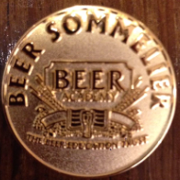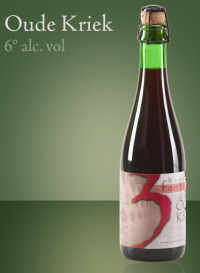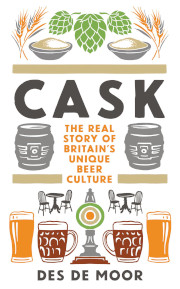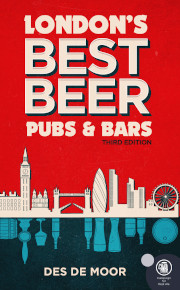Beer sellers: Beermania
ABV: 6%
Origin: Beersel, Vlaams-Brabant, Vlaanderen
Website: www.3fonteinen.be
Traditional spontaneously fermented lambic beer doesn’t reach the consumer without being subjected to additional processes of maturation, blending and/or steeping with fruit to make it palatable. Though today’s better known lambic breweries generally carry out such processes themselves, there are opportunities for a third, non-brewing, party to get involved, as in the production of blended Scotch whisky or certain fortified wines. In the past there were numerous independent dealers and blenders of lambic in Pajottenland, including pubs that prided themselves on their own blends, particularly of g(u)euze, the flagship sparkling blend of old and new lambics. The term geuzestekerij, geuze tappery, is now used for independent blenders, though according to the authors of the newly updated LambicLand (2010), it was based on a coinage by Peter Crombecq, a founding father of modern Belgian beer appreciation, which places it no earlier than the 1970s.
The Debelder family started blending lambics in 1953 at their Beersel pub, De Drie Bronnen (‘The three springs’), and continued the practice when they moved to the Drie Fonteinen (‘Three fountains’) pub-restaurant in the same village. Over the decades Gaston Debelder and then his sons Guido and Armand built Drie Fonteinen’s reputation to the extent that it became one of best known Pajottenland lambic cafés, acquiring worldwide fame as enthusiasm for Belgian craft beer went global, with its bottled lambics available far beyond Beersel. In the 199os, concerned at the dwindling supplies of wholesale lambic, Armand took the decision to start brewing it himself, setting up a new company, AD Bieren, and the cachet of his 3 Fonteinen brands among international beer enthusiasts looked set to keep growing.
Then in May 2009 disaster struck: a thermostat in one of his temperature-controlled storehouses in nearby Halle failed over the weekend, ruining 50,000 litres of uninsured beer, worth €224,000, in the middle of its bottle conditioning process. Coming at a time when Armand was already in difficulties financing his brewing kit, this could have meant the end of AD Bieren, but in an impressive display of generosity, beer fans and brewers rallied round. 30 volunteers spent a Saturday pouring out all the bottles, worth a considerable amount even empty, so the contents — drinkable but not properly matured to the brewery’s high standards — could be shipped to the Biercée distillery in Thuin for turning into the world’s first lambic eau-de-vie. Named Armand’Spirit, it was largely pre-sold even before the stills fired up.
Now, while a return to brewing is unlikely in the forseeable future, 3 Fonteinen continues to blend using its own old stocks and bought-in lambics, and still commissions non-lambic beers from De Proef under the Beersel brand. Its signature products remain its Oude Geuze and Oude Kriek, its versions of the two legally recognised and protected lambic styles. The base lambic is made from 40% unmalted wheat alongside barley malt with properly aged hops as standard for the style; the kriek contains 35% genuine sour kriek cherrries.
My tasting notes for the kriek are for a 2004 bottling I bought in Liège, back when 3 Fonteinen was brewing, and finally opened almost four years later, but still well short of its best before date of 2014. The beer poured a proper cherry red with a foamy pink head that soon declined. There were cherry stones, lanolin and fruity sharpness in a slightly salty aroma, and an absolutely dry and clean tart palate softened by subtle fruit with hints of lemon juice and apple. The swallow felt like it had rinsed my teeth, setting up a tart finish with subtle almond, cherry and blackcurrant notes. Overall this was an extremely elegant beer, dead dry but well-balanced and not as challenging as some examples of this fascinating family of beers.
Update May 2012: Thanks to particularly strong sales since the accident, 3 Fonteinen has been able to restore its brewing capacity earlier than expected. A new brewery is being installed over summer 2012 and should be in operation for the 2012/13 brewing season.
Read more about this beer at ratebeer.com: http://www.ratebeer.com/beer/3-fonteinen-oude-kriek/11175/






Leave a Reply